You are here
Legends of Shakpak ata.
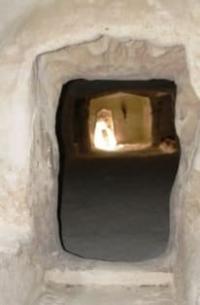
Adai Legends of Mangistau.
"During prayer, nothing foreign should be between the person praying and the goal of his pious thoughts - holy Mecca, so he sticks a stick in front of him in the ground, which should represent Mecca. If someone passes by, he remains outside this boundary and, therefore, is not an obstacle for the person praying, since the connection between him and his Mecca is not broken. The upper end of the stick is decorated with simple carving, a round head or a miniature likeness of a mosque dome, while the lower end has an iron tip to better hold on to the ground."
"Among Kirghiz and Turkmen on Mangyshlak." Richard Karutz. 1903.
Legends of Mangyshlak Peninsula.
Shahrih ata had two sons: Shah-Mardan and Kaba-Ali, who is also called Kapam ata. Shah-Mardan is better known by the name Shakpak ata (shakpak - to strike fire), because when he needed to get fire on the road, he only had to touch one nail to another for sparks to fly in abundance.
Once, Shakpak ata, after finishing his prayer, fell asleep in the mosque. At that time, a large party from a hostile clan, having robbed the nomadic tribes nearby, approached the mosque with the aim of robbing its saint, but finding the doors tightly locked from the inside, they could not break them down, so the robbers began to dig.
When they had already finished undermining the wall, then the murids who were in the mosque, hearing a knock, exclaimed:
- "Oh, Shakpak ata, help!"
At that moment, all those digging turned to stone. It happened many times that those who falsely swore the name of Karaman ata died immediately and their lineage ceased.
Authority:
"Collection of information about the Caucasian highlanders". Legends of the Adaevites about the saints of the Hanafi sect who lived and died in Mangyshlak." The proposed stories are written from the words of Kafar Karadzhigitov, Bik-Bulat Yesekenov and Mullah Khodja-Berdy. Issue VII. Tiflis. 1873.
In 1975, an 81-year-old resident of the village of Shair near the village of Karaduan on Mangyshlak, Asarbay Esbulatov, reported a folk legend associated with the name of Shakpak ata. According to this legend, Shakpak ata is not the name of the founder of the mosque, but a nickname given to him because in battles with enemies, sparks flew from his weapon, like from flint - shakpak-tasa.
This caused panic among the enemies, and they fled from the battlefield. He was from the Nogaily people, who roamed Mangyshlak and drove out the Kalmyks and Turkmens from here. Another informant, Aituar Burkutov, a resident of the village of Tauchik on Mangyshlak, also confirmed the existence of such a legend, suggesting that perhaps this nickname appeared due to the presence of a flint stone near the mosque.
Authority:
Mendikulov M.M. "Monuments of Folk Architecture of Western Kazakhstan". Alma-Ata, Oner, 1987.
Warrior Shakpak ata.
"Legend is the adopted daughter of history"
- "Black clouds of sadness descended from the sky on people. The burden of betrayal pressed people to the ground like an unbearable burden. The weight of deception did not allow them to raise their heads and look each other in the eyes. How to live if there are weak in spirit among them?
How can we enjoy life if there is deception? How can we sleep peacefully without trusting each other? And then they called a council to decide what to do next. People argued for a long time, thought over many things, but could not find a single solution.
Looking at this, Allah came down to them and commanded:
- "Disperse across the sacred land of Mangistau, live in peace and harmony. Settle further, but be closer. Young warriors will guard your peace. And let them call your people free, which sounds in Turkic as - Kazakh!"
So, by the command of Allah, the yurts of the villages rose up throughout the land of Mangistau. Detachments of glorious horsemen guarded them. During the great tois, all the people gathered together to celebrate the holiday and choose the most dexterous, wise and cheerful young man in competitions.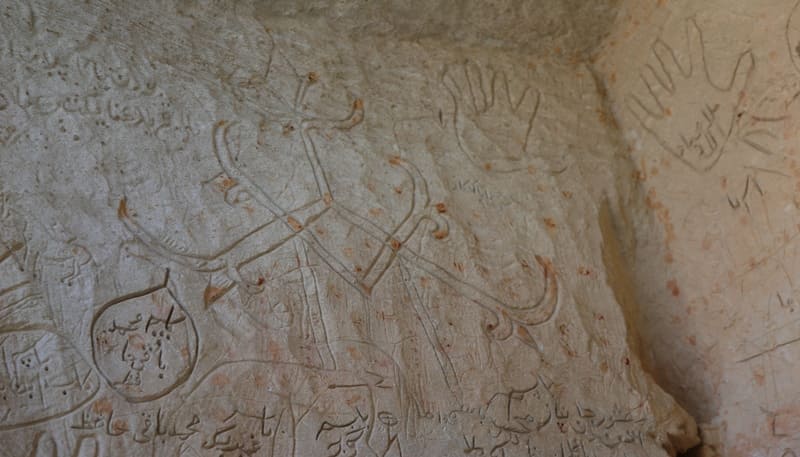
One day, Allah himself expressed a desire to attend such competitions. He turned into a traveler and came to the toi. When the winner was determined, Allah himself decided to test him. He released his horse, and the young man saddled it. Allah released an arrow, and the young man caught up with it. Then Allah asked the young man:
- "What cannot be stopped, overtaken and forgotten on earth?"
To which the young man answered:
- "Time!"
Allah liked the young man. And he gifted him with a sword. And that sword was not simple. It chopped everything, and, chopping, struck sparks, which, falling, froze on the stones. To this day, those sparks are visible in the sun, they indicate the places where the young man fought.
And the water infused with those stones gives people strength, dexterity and wisdom. For this gift, the warrior was nicknamed Shakpak. People calmed down, thinking that peaceful, good times had come. But the enemies did not resign themselves to their defeat, they did not want to give new lands to the free people.
They constantly sent their troops against the villagers, but, like waves broken against the rocks, they retreated. Then they united, deciding to defeat the warriors of Karaman Ata together. Like a storm from the horizon, covering the skies, so countless troops crawled to the sacred land and it seemed that there would be no salvation from them.
And then Allah came down to Shakpak and told him what to do. Like hungry dogs, the enemies rushed at Shakpak's troops, expecting an easy victory. But the rocks surrounding the battlefield did not let the hordes of enemies in, meeting them with stones and arrows.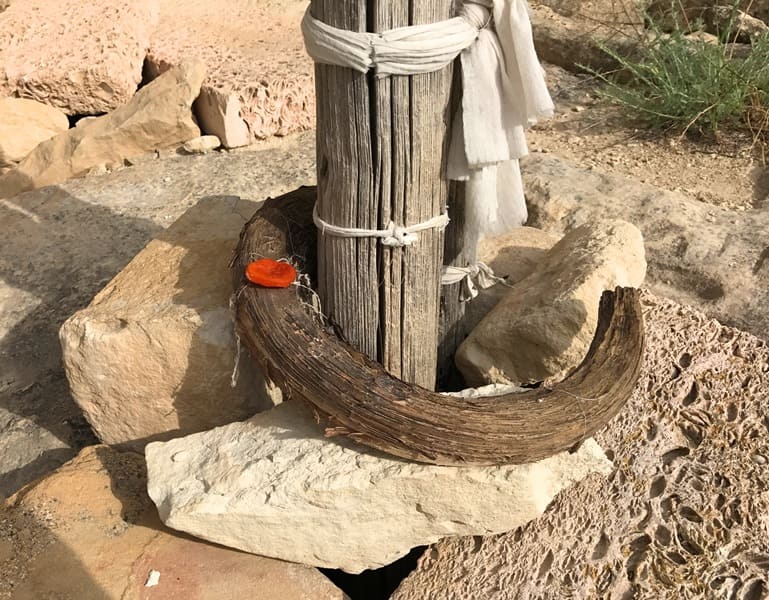
Those who broke through fell from the swords of the fearless warriors of Shakpak, who, standing on the rock, directed the battle. For several days and nights, the blows of swords did not subside, and the number of enemies did not decrease. But when the troops of defenders wavered from fatigue, Shakpak steadfastly stood at their head.
And his sword, mowing down the enemies, struck sparks, from which it became as light as day. The enemies realized that Allah himself was helping the detachment of settlers, and they fled in fear. In honor of this victory, a mosque was carved out in the rock from which Shakpak ata fought.
And for many years, young men studied wisdom, honor and faith in Allah Almighty in it. And after the hero's death, on the spot where Shakpak ata stood during the battle, people cut out a grave for him, asking the Almighty Allah and the power of Shakpak ata to bestow upon them what they lacked.
The people of Mangistau quickly multiplied. The sacred land taught them wisdom and freedom. At the same time, the enemies' hatred of free people grew. Most of all, they sought to destroy the village of Karaman-Ata, which taught people friendship, kindness, and the Shakpak ata mosque, which carried wisdom and strength.
Envy and malice choked the robbers, but Allah, the most just, did not allow them to offend his beloved people. One day, the enemies, through treachery and deceit, broke into the area of the Shakpak ata mosque. They chopped up defenseless children with swords, and drove the survivors into the mosque and blocked the entrance with heavy stones.
Having set up an ambush, the enemies waited for the return of the detachment of young warriors and laughed at the children exhausted by hunger. The weeping skies sought to water the prisoners with rain. The wind blew out the rocks to free them from captivity.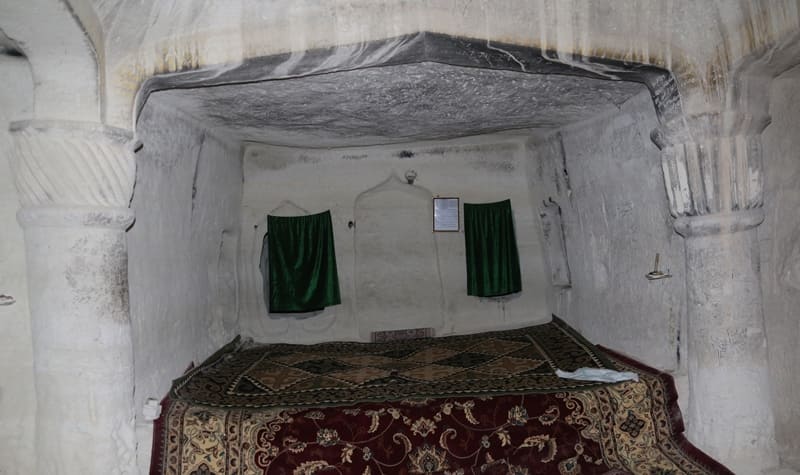
Nature helped the poor children with all its might. Hungry, they saw a snake crawling towards them.
- "Do not lose heart," said the snake.
- "Take in your hands everything you find and chop the stone. On the other side, not far from the entrance, you will meet a detachment of young warriors. Warn them about the ambush."
For several days and nights, the exhausted children chopped rocks. The wounds on their hands cried blood. Their eyes were blinded by the dust. Thanks to Allah the Almighty, a passage was cut through, but it was so small that only the smallest of the hermits could get through it.
And then Shakpak ata rose from the grave, struck the passage with his staff and turned it into a magic one. Any honest man could now go out without bending, while for the dishonest it remained impassable. The children jumped out and managed to warn the warriors about the ambush.
Like the wind, the horsemen burst into the enemy camp, and having destroyed them, left their bodies to be torn apart by wild animals. And to this day, people visiting the Shakpak ata mosque, when leaving, praise the brave warriors and the spirit of Shakpak ata.
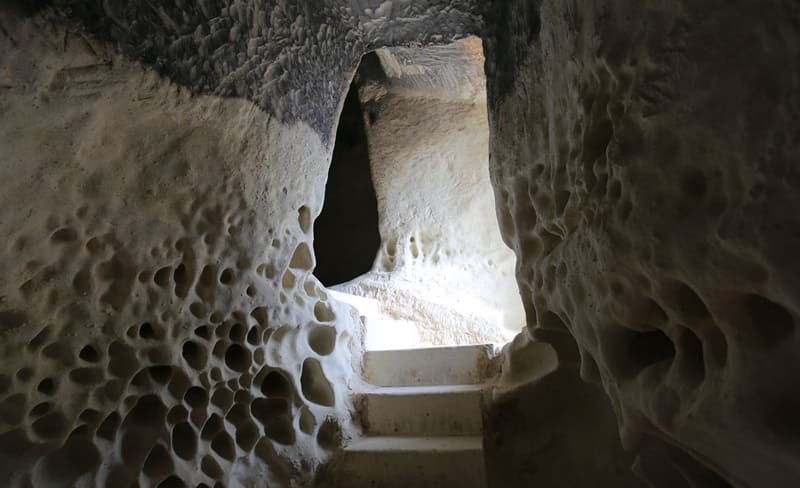
Authority:
Sanislav Li. City of Aktau.
Photos by:
Alexander Petrov.







